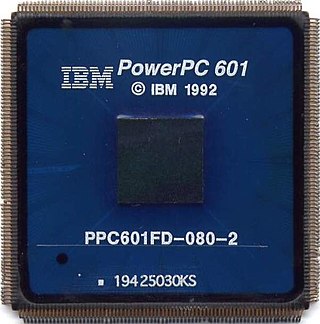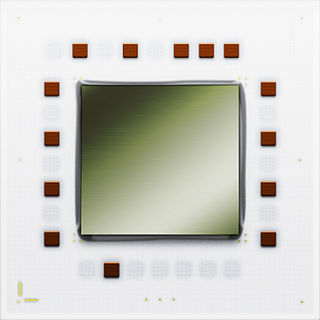
AIX is a series of proprietary Unix operating systems developed and sold by IBM for several of its computer platforms.

PowerPC is a reduced instruction set computer (RISC) instruction set architecture (ISA) created by the 1991 Apple–IBM–Motorola alliance, known as AIM. PowerPC, as an evolving instruction set, has been named Power ISA since 2006, while the old name lives on as a trademark for some implementations of Power Architecture–based processors.

The IBM AS/400 is a family of midrange computers from IBM announced in June 1988 and released in August 1988. It was the successor to the System/36 and System/38 platforms, and ran the OS/400 operating system. Lower-cost but more powerful than its predecessors, the AS/400 was extremely successful at launch, with an estimated 111,000 installed by the end of 1990 and annual revenue reaching $14 billion that year, increasing to 250,000 systems by 1994, and about 500,000 shipped by 1997.

The IBM System p is a high-end line of RISC (Power)/UNIX-based servers. It was the successor of the RS/6000 line, and predecessor of the IBM Power Systems server series.
AltiVec is a single-precision floating point and integer SIMD instruction set designed and owned by Apple, IBM, and Freescale Semiconductor — the AIM alliance. It is implemented on versions of the PowerPC processor architecture, including Motorola's G4, IBM's G5 and POWER6 processors, and P.A. Semi's PWRficient PA6T. AltiVec is a trademark owned solely by Freescale, so the system is also referred to as Velocity Engine by Apple and VMX by IBM and P.A. Semi.

The POWER5 is a microprocessor developed and fabricated by IBM. It is an improved version of the POWER4. The principal improvements are support for simultaneous multithreading (SMT) and an on-die memory controller. The POWER5 is a dual-core microprocessor, with each core supporting one physical thread and two logical threads, for a total of two physical threads and four logical threads.
The POWER1 is a multi-chip CPU developed and fabricated by IBM that implemented the POWER instruction set architecture (ISA). It was originally known as the RISC System/6000 CPU or, when in an abbreviated form, the RS/6000 CPU, before introduction of successors required the original name to be replaced with one that used the same naming scheme (POWERn) as its successors in order to differentiate it from the newer designs.

The POWER4 is a microprocessor developed by International Business Machines (IBM) that implemented the 64-bit PowerPC and PowerPC AS instruction set architectures. Released in 2001, the POWER4 succeeded the POWER3 and RS64 microprocessors, enabling RS/6000 and eServer iSeries models of AS/400 computer servers to run on the same processor, as a step toward converging the two lines. The POWER4 was a multicore microprocessor, with two cores on a single die, the first non-embedded microprocessor to do so. POWER4 Chip was first commercially available multiprocessor chip. The original POWER4 had a clock speed of 1.1 and 1.3 GHz, while an enhanced version, the POWER4+, reached a clock speed of 1.9 GHz. The PowerPC 970 is a derivative of the POWER4.

POWER7 is a family of superscalar multi-core microprocessors based on the Power ISA 2.06 instruction set architecture released in 2010 that succeeded the POWER6 and POWER6+. POWER7 was developed by IBM at several sites including IBM's Rochester, MN; Austin, TX; Essex Junction, VT; T. J. Watson Research Center, NY; Bromont, QC and IBM Deutschland Research & Development GmbH, Böblingen, Germany laboratories. IBM announced servers based on POWER7 on 8 February 2010.
PowerLinux is the combination of a Linux-based operating system (OS) running on PowerPC- or Power ISA-based computers from IBM. It is often used in reference along with Linux on Power, and is also the name of several Linux-only IBM Power Systems.

The POWER6 is a microprocessor developed by IBM that implemented the Power ISA v.2.05. When it became available in systems in 2007, it succeeded the POWER5+ as IBM's flagship Power microprocessor. It is claimed to be part of the eCLipz project, said to have a goal of converging IBM's server hardware where practical.
Hardware Management Console (HMC) is a Physical / Virtual appliance used to manage IBM Systems including IBM AS/400, IBM System p, IBM System z, and IBM Power Systems. HMC supports command line (ssh) as well as web (https) user interfaces and REST API. Using an HMC, the system administrator can manage many systems and partitions. It can also be used for monitoring and servicing a system.
PowerVM, formerly known as Advanced Power Virtualization (APV), is a chargeable feature of IBM POWER5, POWER6, POWER7, POWER8, POWER9 and Power10 servers and is required for support of micro-partitions and other advanced features. Support is provided for IBM i, AIX and Linux.

IBM Power Systems is a family of server computers from IBM that are based on its Power processors. It was created in 2008 as a merger of the System p and System i product lines.
IBM Power microprocessors are designed and sold by IBM for servers and supercomputers. The name "POWER" was originally presented as an acronym for "Performance Optimization With Enhanced RISC". The Power line of microprocessors has been used in IBM's RS/6000, AS/400, pSeries, iSeries, System p, System i, and Power Systems lines of servers and supercomputers. They have also been used in data storage devices and workstations by IBM and by other server manufacturers like Bull and Hitachi.

POWER9 is a family of superscalar, multithreading, multi-core microprocessors produced by IBM, based on the Power ISA. It was announced in August 2016. The POWER9-based processors are being manufactured using a 14 nm FinFET process, in 12- and 24-core versions, for scale out and scale up applications, and possibly other variations, since the POWER9 architecture is open for licensing and modification by the OpenPOWER Foundation members.
The OpenPOWER Foundation is a collaboration around Power ISA-based products initiated by IBM and announced as the "OpenPOWER Consortium" on August 6, 2013. IBM's focus is to open up technology surrounding their Power Architecture offerings, such as processor specifications, firmware, and software with a liberal license, and will be using a collaborative development model with their partners.

Power ISA is a reduced instruction set computer (RISC) instruction set architecture (ISA) currently developed by the OpenPOWER Foundation, led by IBM. It was originally developed by IBM and the now-defunct Power.org industry group. Power ISA is an evolution of the PowerPC ISA, created by the mergers of the core PowerPC ISA and the optional Book E for embedded applications. The merger of these two components in 2006 was led by Power.org founders IBM and Freescale Semiconductor.











